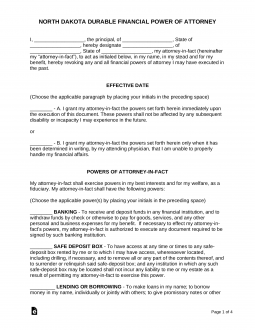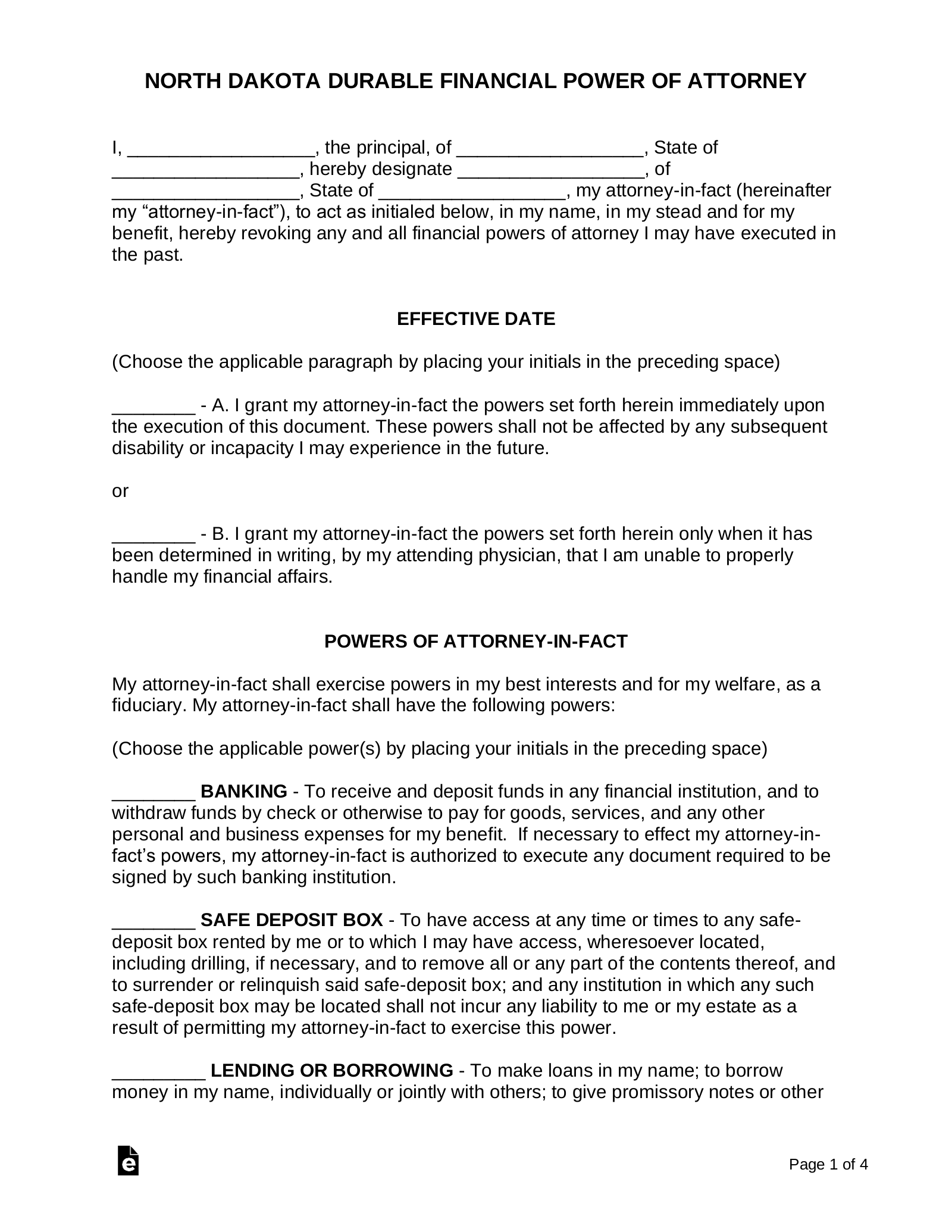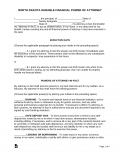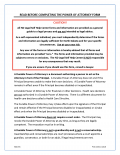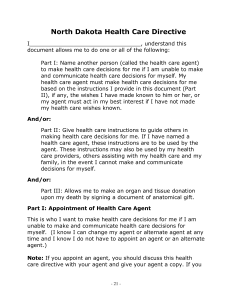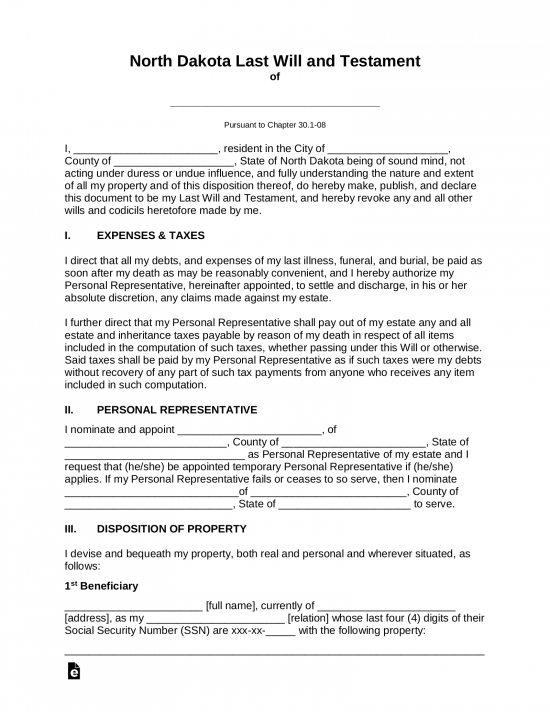Updated August 09, 2023
A North Dakota durable power of attorney form allows a person to choose someone else to handle and conduct financial affairs on their behalf. The powers handed over can be as trivial as paying bills to as serious as running the day-to-day operations of a business. The term “durable” refers to the form remaining valid even if the person giving power becomes incapacitated and not able to think for themselves. Therefore, it’s highly recommended that the person designated be a trusted individual.
Versions (2)
Download: PDF, MS Word, OpenDocument
Download: PDF
Instructions: PDF
Table of Contents |
Laws
Chapter 30.1-30 (Uniform Durable Power of Attorney Act)
Definition of “Durable”
All acts done by an attorney in fact pursuant to a durable power of attorney during any period of disability or incapacity of the principal have the same effect and inure to the benefit of and bind the principal and the principal’s successors in interest as if the principal were competent and not disabled (§30.1-30-02)
Definition of “Power of Attorney”
A durable power of attorney is a power of attorney by which a principal designates another as the principal’s attorney in fact in writing and the writing contains the words “This power of attorney is not affected by subsequent disability or incapacity of the principal or by lapse of time,” or “This power of attorney becomes effective upon the disability or incapacity of the principal,” or similar words showing the intent of the principal that the authority conferred is exercisable notwithstanding the principal’s subsequent disability or incapacity, and, unless it states a time of termination, notwithstanding the lapse of time since the execution of the instrument (§30.1-30-01)
Signing Requirements
No State law, although the State of North Dakota Courts Version requires a notary acknowledgment.
Statutory Form
The North Dakota Legislature has not provided a statutory durable power of attorney form.
How to Write
Download: PDF, MS Word, OpenDocument
1 – Download The Appropriate File Then Open The Document
Locate the preview image then click the button with the desired file type to access this file. If you wish to preview the document, you may select the image to peruse it. Once you have obtained the file, gather the paperwork, then fill it out. The Principal’s direct interaction will be required.
2 – This Template Will Use The Introduction To Name The Parties Directly Involved
The first paragraph of this appointment shall deliver a summary of this document’s intention and will generally act in most situations when an Attorney-in-Fact must be granted a Principal’s Authority. However, for this document to apply correctly, you must submit the Principal’s Legal Name on the first blank line of this paragraph, his or her Street Address (Building Number/Street/Unit/City) on the second one, and the State where this address is found on the third line. Make sure when documenting his or her Address that it is the Principal’s Residential Address. 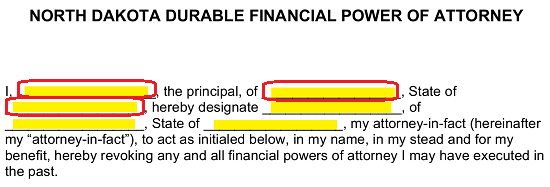 The introduction will continue to require information after the words “…Hereby Designate.” The three available spaces following this phrase must have the Attorney-in-Fact’s Legal Name furnished on the first available space after this phrase, his or her Residential Street Address on the second available space, and his or her State on the third available space. As with the Principal, make sure this is the Residential Address of the Attorney-in-Fact. In the instances where the Attorney-in-Fact is a legal entity, record its Legal Address on these spaces. This must be a Physical Address.
The introduction will continue to require information after the words “…Hereby Designate.” The three available spaces following this phrase must have the Attorney-in-Fact’s Legal Name furnished on the first available space after this phrase, his or her Residential Street Address on the second available space, and his or her State on the third available space. As with the Principal, make sure this is the Residential Address of the Attorney-in-Fact. In the instances where the Attorney-in-Fact is a legal entity, record its Legal Address on these spaces. This must be a Physical Address.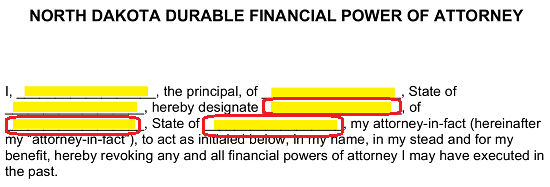
3 – The Principal Must Indicate The Determined Period Of Effect
Since the Powers issued here will be durable, the Principal’s incapacitation will not terminate them. Only his or her Revocation or Death will. However, the event when these Principal Powers are formally delivered must be determined and reported in “Effective Date.” Such a report can occur only through the Principal Act of initialing. If the Principal wishes the Authority granted through this paperwork to begin as soon as he or she signs this document, the Principal will need to initial the first statement in this section (labeled “A”). 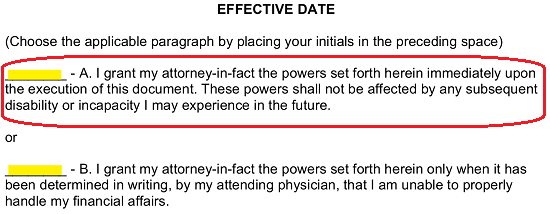 If the Principal only wants the Authority delivered here to become available to the Attorney-in-Fact, when he or she incapacitated and reported as much by the attending physician, then the Principal will need to initial the statement labeled as “B”
If the Principal only wants the Authority delivered here to become available to the Attorney-in-Fact, when he or she incapacitated and reported as much by the attending physician, then the Principal will need to initial the statement labeled as “B”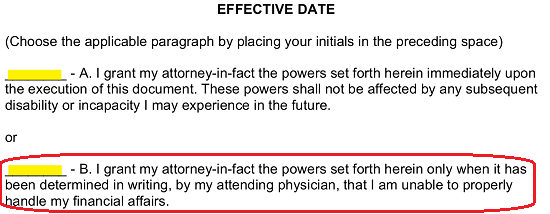
4 – Only Principal Action Can Formally Dictate Which Principal Powers Will Be Granted
The individual executing this paperwork, referred to as the Principal, will need to determine what precisely he or she will authorize the Attorney-in-Fact can do with Principal Authority. That is, he or she will need to review the list of labeled paragraph statements in the “Powers Of Attorney-in-Fact” section and physically initial each statement that contains an apt description of what Principal Activities the Attorney-in-Fact may engage in with Principal Approval. Note: Any paragraph left un-initialed will not be included in the range of the Attorney-in-Fact’s Principal Powers).
The Principal’s “Banking” activities can be conducted by the Attorney-in-Fact as if he or she were the Principal once the Principal initials the first paragraph in this list. If left unmarked the Attorney-in-Fact will not be able to conduct any of the business defined in it. The Attorney-in-Fact will have the Principal Approval to wield Principal Authority over the contents of the Principal’s “Safe Deposit Box” as per the second paragraph. If the Principal has determined this should be within the Attorney-in-Fact’s scope of Principal Authority, then he or she should initial the blank line provided. If not, the Principal should leave this line unaltered.
The Attorney-in-Fact will have the Principal Approval to wield Principal Authority over the contents of the Principal’s “Safe Deposit Box” as per the second paragraph. If the Principal has determined this should be within the Attorney-in-Fact’s scope of Principal Authority, then he or she should initial the blank line provided. If not, the Principal should leave this line unaltered. The Principal will need to initial the third paragraph if he or she intends to grant the Attorney-in-Fact with the Authority to engage in “Lending Or Borrowing” activities with his or her finances. If the Principal does not wish to deliver this Power, the third paragraph should not be initialed.
The Principal will need to initial the third paragraph if he or she intends to grant the Attorney-in-Fact with the Authority to engage in “Lending Or Borrowing” activities with his or her finances. If the Principal does not wish to deliver this Power, the third paragraph should not be initialed. Any “Government Benefits” the Principal currently receives or is eligible for may be acted upon by the Attorney-in-Fact with Principal Authority through the language in the fourth paragraph. To grant this Power, the Principal needs to initial the fourth paragraph. To withhold this Power, the Principal should leave this paragraph unmarked.
Any “Government Benefits” the Principal currently receives or is eligible for may be acted upon by the Attorney-in-Fact with Principal Authority through the language in the fourth paragraph. To grant this Power, the Principal needs to initial the fourth paragraph. To withhold this Power, the Principal should leave this paragraph unmarked. If the Principal can apply or already is in a “Retirement Plan” and wishes the Attorney-in-Fact to have the Principal Authority to conduct these affairs with his or her approval, the Principal will need to initial the fifth paragraph. To exclude his or her Retirement Plans from being affected by the Attorney-in-Fact’s use of Principal Power, this paragraph should not be initialed.
If the Principal can apply or already is in a “Retirement Plan” and wishes the Attorney-in-Fact to have the Principal Authority to conduct these affairs with his or her approval, the Principal will need to initial the fifth paragraph. To exclude his or her Retirement Plans from being affected by the Attorney-in-Fact’s use of Principal Power, this paragraph should not be initialed. The Principal can deliver his or her Authority with Principal “Taxes” by initialing the sixth paragraph. The Attorney-in-Fact can be restricted from acting in any such matter if this is left unmarked.
The Principal can deliver his or her Authority with Principal “Taxes” by initialing the sixth paragraph. The Attorney-in-Fact can be restricted from acting in any such matter if this is left unmarked. Any type of “Insurance” the Principal does or may deal with can be maintained, purchased, discontinued, or applied for in the Principal’s Name through the Attorney-in-Fact’s use of Principal Authority if the Principal initials the blank line corresponding to the seventh paragraph. Such matters may be restricted from the Attorney-in-Fact’s Principal Actions if this paragraph is left unaltered.
Any type of “Insurance” the Principal does or may deal with can be maintained, purchased, discontinued, or applied for in the Principal’s Name through the Attorney-in-Fact’s use of Principal Authority if the Principal initials the blank line corresponding to the seventh paragraph. Such matters may be restricted from the Attorney-in-Fact’s Principal Actions if this paragraph is left unaltered. The Principal’s “Real Estate” matters can be controlled by the Attorney-in-Fact, with Principal Approval, if the Principal initials the eighth paragraph in this list. If the Principal does not want to deliver this type of Authority to the Attorney-in-Fact, he or she should leave this paragraph unmarked.
The Principal’s “Real Estate” matters can be controlled by the Attorney-in-Fact, with Principal Approval, if the Principal initials the eighth paragraph in this list. If the Principal does not want to deliver this type of Authority to the Attorney-in-Fact, he or she should leave this paragraph unmarked. If the Attorney-in-Fact should have the same access and control to the Principal’s “Personal Property” as the Principal does, the Principal will need to make sure to initial the ninth list item. If the Principal has determined the Attorney-in-Fact should not be granted Principal Power in such a capacity, he or she should refrain from initialing this statement.
If the Attorney-in-Fact should have the same access and control to the Principal’s “Personal Property” as the Principal does, the Principal will need to make sure to initial the ninth list item. If the Principal has determined the Attorney-in-Fact should not be granted Principal Power in such a capacity, he or she should refrain from initialing this statement. The Principal can grant the Attorney-in-Fact his or her “Power To Manage Property” by initialing the tenth paragraph. If this paragraph is not initialed by the Principal, it will not be included in the Attorney-in-Fact’s Principal Powers.
The Principal can grant the Attorney-in-Fact his or her “Power To Manage Property” by initialing the tenth paragraph. If this paragraph is not initialed by the Principal, it will not be included in the Attorney-in-Fact’s Principal Powers. The Principal can enable the Attorney-in-Fact to engage in Principal Activities with “Gifts” (or Gifting) with Principal Power through the act of initialing the eleventh paragraph. To deny this Power to the Attorney-in-Fact the Principal should leave this paragraph’s line blank.
The Principal can enable the Attorney-in-Fact to engage in Principal Activities with “Gifts” (or Gifting) with Principal Power through the act of initialing the eleventh paragraph. To deny this Power to the Attorney-in-Fact the Principal should leave this paragraph’s line blank. Any “Legal Advice And Proceedings” involving or potentially involving the Principal can be engaged with by the Attorney-in-Fact wielding Principal Authority. If it has been determined the Attorney-in-Fact should not use Principal Authority in this manner, the Principal should leave this paragraph blank.
Any “Legal Advice And Proceedings” involving or potentially involving the Principal can be engaged with by the Attorney-in-Fact wielding Principal Authority. If it has been determined the Attorney-in-Fact should not use Principal Authority in this manner, the Principal should leave this paragraph blank. In case the Principal has any additional provisions or instructions regarding the extent or restriction of these Powers, this should be accurately represented using the blank lines in the “Special Instructions”
In case the Principal has any additional provisions or instructions regarding the extent or restriction of these Powers, this should be accurately represented using the blank lines in the “Special Instructions”
5 – An Executing Signature Delivered By The Principal Will Set This Paperwork In Motion
The final act the Principal must take with this document will be the Act of Signing. He or she will need to locate the statement “In Witness Whereof, I Have On This…,” then enter the Date he or she signs this paperwork on the three available lines it contains. The Principal must sign the blank line with the label “Principal’s Signature.”
The Principal must sign the blank line with the label “Principal’s Signature.” The two individuals who have watched the Principal provide his or her Signature will need to sign their Names at the end of the Witness Testimony provided. Additionally, each one should record his or her Residential Address just below the provided signature. There will be enough room for two Witnesses to provide these required items.
The two individuals who have watched the Principal provide his or her Signature will need to sign their Names at the end of the Witness Testimony provided. Additionally, each one should record his or her Residential Address just below the provided signature. There will be enough room for two Witnesses to provide these required items.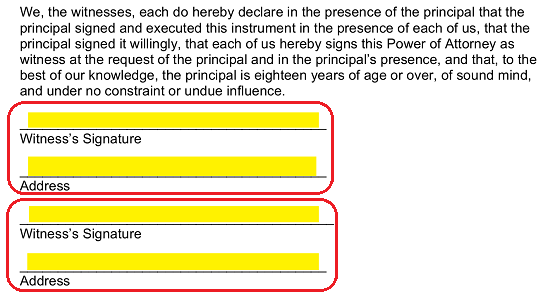 In addition to the signed Witness Testimony, the Principal’s Signature should be further substantiated through the notarization process. Thus, only the Notary Public can fill out the next area.
In addition to the signed Witness Testimony, the Principal’s Signature should be further substantiated through the notarization process. Thus, only the Notary Public can fill out the next area.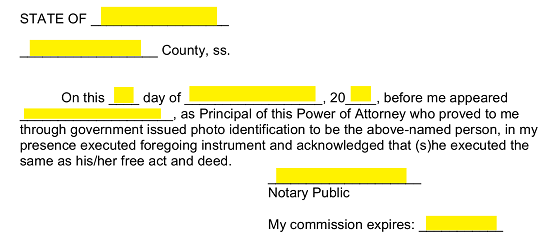 The final area requiring attention is “Specimen Signature And Acceptance Of Appointment.” The Attorney-in-Fact will need to have his or her Name presented on the blank line between the words “I” and “The Attorney-in-Fact.” If he or she agrees with this statement and intends to accept the responsibilities of Principal Powers, then he or she must sign the “Attorney-in-Fact’s Signature” line.
The final area requiring attention is “Specimen Signature And Acceptance Of Appointment.” The Attorney-in-Fact will need to have his or her Name presented on the blank line between the words “I” and “The Attorney-in-Fact.” If he or she agrees with this statement and intends to accept the responsibilities of Principal Powers, then he or she must sign the “Attorney-in-Fact’s Signature” line. The Attorney-in-Fact’s Signing will have a separate area for its notarization.
The Attorney-in-Fact’s Signing will have a separate area for its notarization.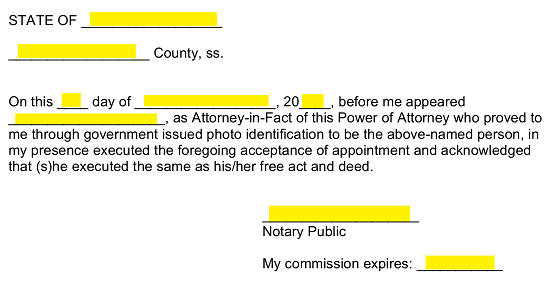
Related Forms
Download: PDF
Download: PDF

